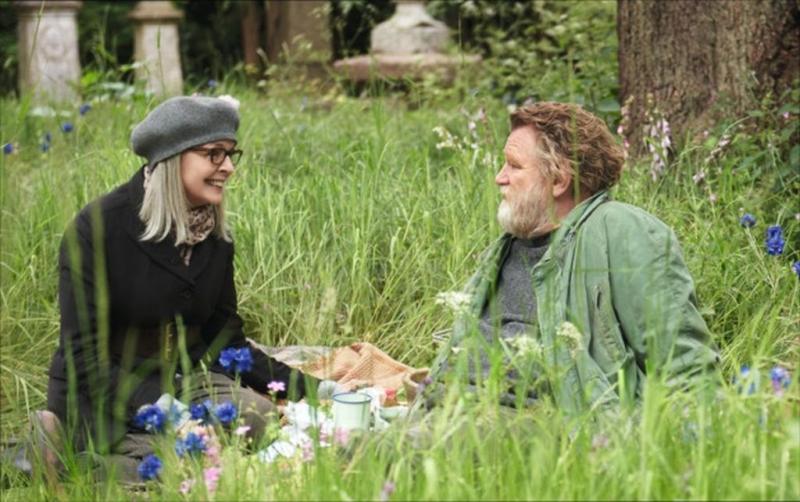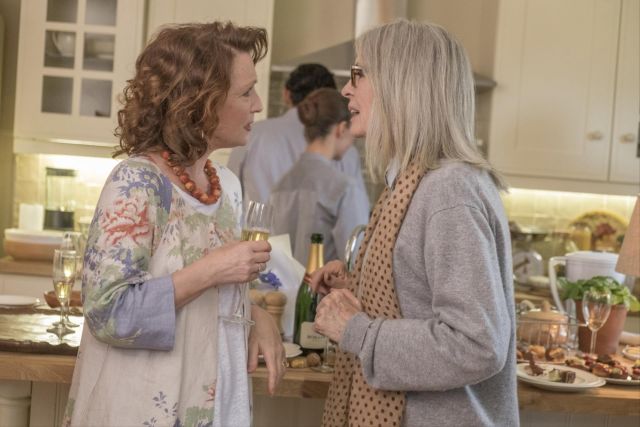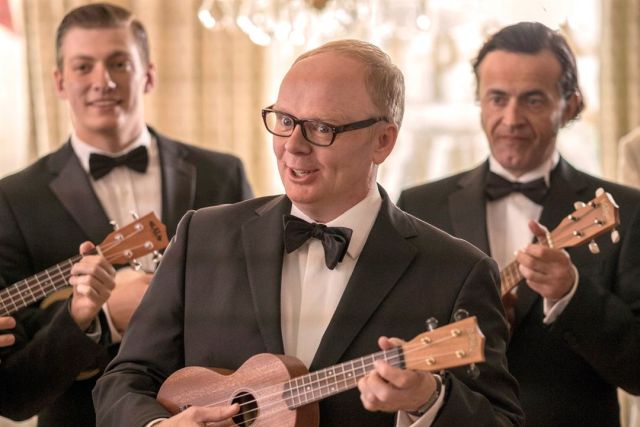Hampstead review - Diane Keaton deserves better and so does London | reviews, news & interviews
Hampstead review - Diane Keaton deserves better and so does London
Hampstead review - Diane Keaton deserves better and so does London
Wince-making romcom is pretty but preposterous

Do the makers of the essentially unnecessary Hampstead have a secret vendetta against north London and its citizenry?
Sure, the Heath is great (I've lived on a street adjacent to it for years), and one is indeed likely to run into Simon Callow now and again, as happens here. But even the briefest of time in the company of Keaton's self-created community would find any sane person hopping the overground to Dalston – which is not a suggestion for a new film title, by the way, if all involved are pondering a sequel.
Hell, so abject is the situation in which the recently widowed American expat, Emily (Keaton), finds herself that her faintly smarmy son (an entirely wasted James Norton) can't even be bothered to be around for her birthday. Between filial neglect and an assemblage of squawking and unctuous neighbours who value flashy new flats over hospitals, it's not difficult to see why Emily takes more than a passing glance in the direction of the shambolic Donald (Brendan Gleeson), a Heath-dwelling iconoclast who at least seems to have a heart. On the other hand, I can imagine plenty of women drawing the line at conversational gambits like "the Heath rain is a harsh mistress". If this were Annie Hall, and Keaton's wardrobe often suggests that sartorially at least it just might be, that remark would achieve total heaviosity.
 Donald, in fact, is a cinematic reimagining of the late Harry Hallowes, the real-life Irishman whose longterm residency on the heath resulted in a successful claim to a sliver of land that is thought to have been worth several million pounds. Robert Festinger's screenplay nods vacantly at the disconnect between the struggles of the Harrys/Donalds of this world and the patronising bubble inhabited by the moneyed assemblage of harpies whom Emily has for neighbours. But a far more vivid disconnect takes hold between these grotesque harridans – Donald, inevitably, is derided as "that tramp from the Heath" – and the expert actresses playing them: one can only imagine the encoded eye-rolling between Lesley Manville and Deborah Findlay that surely took place in-between takes. (Manville pictured with Keaton, above).
Donald, in fact, is a cinematic reimagining of the late Harry Hallowes, the real-life Irishman whose longterm residency on the heath resulted in a successful claim to a sliver of land that is thought to have been worth several million pounds. Robert Festinger's screenplay nods vacantly at the disconnect between the struggles of the Harrys/Donalds of this world and the patronising bubble inhabited by the moneyed assemblage of harpies whom Emily has for neighbours. But a far more vivid disconnect takes hold between these grotesque harridans – Donald, inevitably, is derided as "that tramp from the Heath" – and the expert actresses playing them: one can only imagine the encoded eye-rolling between Lesley Manville and Deborah Findlay that surely took place in-between takes. (Manville pictured with Keaton, above).
 And with the celluloid likes of Notting Hill now almost 20 years old (we can skip politely over the Paul Bettany-Kirsten Dunst Wimbledon), it's somewhat dismaying to think that the London tourist brochure approach to filmmaking is still of interest to anyone. As someone who has spent significant chunks of my London life on the 24 bus, I was pleased to see that Gleeson and Keaton too have sampled its wares, but the film places so many obstacles in Emily's way that one half expects her quest for a scarf to be something she can then use as a noose. Instead, Keaton's unforced and ageless appeal notwithstanding, our heroine encounters rude shopkeepers and a dubious suitor in her touchy-feely accountant (Jason Watkins, pictured above), whose fondness for liquid lunches and the ukulele can't disguise his status as a creep.
And with the celluloid likes of Notting Hill now almost 20 years old (we can skip politely over the Paul Bettany-Kirsten Dunst Wimbledon), it's somewhat dismaying to think that the London tourist brochure approach to filmmaking is still of interest to anyone. As someone who has spent significant chunks of my London life on the 24 bus, I was pleased to see that Gleeson and Keaton too have sampled its wares, but the film places so many obstacles in Emily's way that one half expects her quest for a scarf to be something she can then use as a noose. Instead, Keaton's unforced and ageless appeal notwithstanding, our heroine encounters rude shopkeepers and a dubious suitor in her touchy-feely accountant (Jason Watkins, pictured above), whose fondness for liquid lunches and the ukulele can't disguise his status as a creep.
The central pairing isn't helped along by a literal-minded script in which Donald identifies himself as being from "Dublin, Ireland" in case you were thinking perhaps Paris, Texas, not to mention a view of romance among the senior set that apparently doesn't stretch to a first kiss. And nary an opportunity is missed to underline such themes as the material possesses. "We all have problems, Donald," Emily announces, keen to make plain that distress can cross the socio-economic divide. Later on, her climactic broadside in the direction of the malign Manville – "I was your quirky American project" – doesn't begin to communicate the feeling that any sentient filmgoer will have long since already muttered on this vibrant actress's behalf.
rating
Explore topics
Share this article
The future of Arts Journalism
You can stop theartsdesk.com closing!
We urgently need financing to survive. Our fundraising drive has thus far raised £49,000 but we need to reach £100,000 or we will be forced to close. Please contribute here: https://gofund.me/c3f6033d
And if you can forward this information to anyone who might assist, we’d be grateful.

Subscribe to theartsdesk.com
Thank you for continuing to read our work on theartsdesk.com. For unlimited access to every article in its entirety, including our archive of more than 15,000 pieces, we're asking for £5 per month or £40 per year. We feel it's a very good deal, and hope you do too.
To take a subscription now simply click here.
And if you're looking for that extra gift for a friend or family member, why not treat them to a theartsdesk.com gift subscription?
more Film
 Iron Ladies review - working-class heroines of the Miners' Strike
Documentary salutes the staunch women who fought Thatcher's pit closures
Iron Ladies review - working-class heroines of the Miners' Strike
Documentary salutes the staunch women who fought Thatcher's pit closures
 Blu-ray: The Man in the White Suit
Ealing Studios' prescient black comedy, as sharp as ever
Blu-ray: The Man in the White Suit
Ealing Studios' prescient black comedy, as sharp as ever
 The Woman in Cabin 10 review - Scandi noir meets Agatha Christie on a superyacht
Reason goes overboard on a seagoing mystery thriller
The Woman in Cabin 10 review - Scandi noir meets Agatha Christie on a superyacht
Reason goes overboard on a seagoing mystery thriller
 London Film Festival 2025 - crime, punishment, pop stars and shrinks
Daniel Craig investigates, Jodie Foster speaks French and Colin Farrell has a gambling habit
London Film Festival 2025 - crime, punishment, pop stars and shrinks
Daniel Craig investigates, Jodie Foster speaks French and Colin Farrell has a gambling habit
 I Swear review - taking stock of Tourette's
A sharp and moving tale of cuss-words and tics
I Swear review - taking stock of Tourette's
A sharp and moving tale of cuss-words and tics
 A House of Dynamite review - the final countdown
Kathryn Bigelow's cautionary tale sets the nuclear clock ticking again
A House of Dynamite review - the final countdown
Kathryn Bigelow's cautionary tale sets the nuclear clock ticking again
 theartsdesk Q&A: Idris Elba on playing a US President faced with a missile crisis in 'A House of Dynamite'
The star talks about Presidential decision-making when millions of lives are imperilled
theartsdesk Q&A: Idris Elba on playing a US President faced with a missile crisis in 'A House of Dynamite'
The star talks about Presidential decision-making when millions of lives are imperilled
 Urchin review - superb homeless drama
Frank Dillane gives a star-making turn in Harris Dickinson’s impressive directorial debut
Urchin review - superb homeless drama
Frank Dillane gives a star-making turn in Harris Dickinson’s impressive directorial debut
 Mr Blake at Your Service review - John Malkovich in unlikely role as an English butler
Weird comedy directed by novelist Gilles Legardinier
Mr Blake at Your Service review - John Malkovich in unlikely role as an English butler
Weird comedy directed by novelist Gilles Legardinier
 Don't Let's Go to the Dogs Tonight review - vivid adaptation of a memoir about a Rhodesian childhood
Embeth Davidtz delivers an impressive directing debut and an exceptional child star
Don't Let's Go to the Dogs Tonight review - vivid adaptation of a memoir about a Rhodesian childhood
Embeth Davidtz delivers an impressive directing debut and an exceptional child star
 One Battle After Another review - Paul Thomas Anderson satirises America's culture wars
Leonardo DiCaprio, Teyana Taylor, and Sean Penn star in a rollercoasting political thriller
One Battle After Another review - Paul Thomas Anderson satirises America's culture wars
Leonardo DiCaprio, Teyana Taylor, and Sean Penn star in a rollercoasting political thriller

Add comment